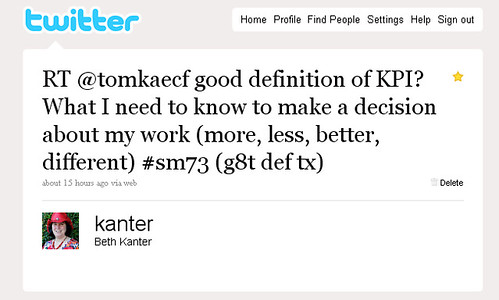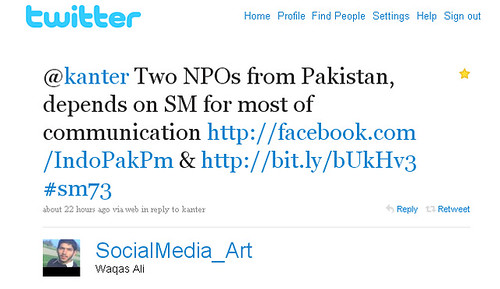
Yesterday, I had the pleasure of participating in Twitter chat series #socialmedia. It’s been a one-hour weekly chat on Twitter for the past 10 months organized and hosted by Marc Meyer and Jason Breed. The way it works is they invite a “host” to ask 3 compelling questions, 20 minutes each, that revolve around a topical subject within the business of social media, but that play to their strengths or backgrounds.
As host for #sm73, I selected three questions on social media and non profits:
Q1: How can social media work for non profits? (Backstory: we know they have time and need money / sometimes volunteers. Can social help this & how?)
Q2: What is the easiest way for an NPO to figure out how to do social?
Q3: What are some of the best case studies of NPO’s using Social and what was the impact?
Prior to the chat, Jason Breed wrote this post about the chat. In addition, leading up to the event – even the last few hours and minutes, both Marc and Jason sent Tweets letting folks know the chat was about to start. This helps builds anticipation and excitement for the event. They also ask the moderator to do the same – this leverages the hosts network.
What I enjoyed about this Twitter chat was the opportunity to ask pointed follow up questions and to draw out specific people. I always learn a lot when I’m get a chance to ask other people questions and this experience did not fail in delivering that.
If you read through the chat transcript there are so many nuggets in there. Two that standout:

In response to my question about how to avoid waiting time, someone responded that you need to have clear objectives and KPIs (Key performance indicators) . Someone asked what the definition of a KPI was, and since I noticed that Tom Kelly who is an expert in evaluation was following the chat, I asked him for a definition. Best definition I’ve seen.

I also learned about this NGO from Pakistan that is using social media efficiently to communicate with its stakeholders.
The complete chat is aggregated here. You’ll notice that the application they’re using allows them to pull out the moderator’s tweets on the side. A couple of Twitter moderator techniques I used to try to get some deeper insights from the discussion:
- I had a search open on #sm73 the whole time. I was watching for answers to the questions. In the beginning, I was summarizing the answers using Q1:A1, Q1:A2 in my tweets. This is what a focus group moderator would do in a face-to-face session. Ask a question, listen to the responses and aggregate them in summarizing statement like “Here’s the ideas that I hear in response to the first question, (xyz).
- Simply summarizing isn’t enough to get to your insights. As I was reading, I looked the aggregated answers and asked follow up questions. Is there something missing on the list? Can I get more clarification to an answer? Is there a more specific follow up question based on these responses? These are standard types of “question probes” and active listening that you would do if you were interviewing someone or moderating a focus group.
- The beauty of Twitter is that you can do a little bit of network weaving to bring other people in the thread. I was scanning who else was on Twitter, but not participating in the thread and I tweeted a question or invitation to join them. I noticed another Twitter chat with a hashtag going on – and “waved” to that group by directing a Tweet to someone I knew and using the hash tag. I also clicked through to people who were participating by re-tweeting the tag or other people’s answers and specifically @reply to them to draw them out.
- As the host, I wanted to be the neutral traffic cop as much as possible – summarizing, drawing out specific people, restating, asking follow up questions, and the like. Another technique is ask the group whether they agree or disagree with someone’s answer. This also sparks more in-depth conversation.
Now, I have some questions:
- This is to my hosts. What is the application that you’re using to aggregate the Tweets?
- What are your best Twitter moderation techniques?
- Has your nonprofit done an online Twitter chat? What was the experience?
Next week, my business partner at Zoetica, Kami Huyse will be the host on #socialmedia. If you haven’t participated in one of these chats, it is well worth your time. You’ll learn a lot, and particularly because Kami is an awesome Twitter moderator.
